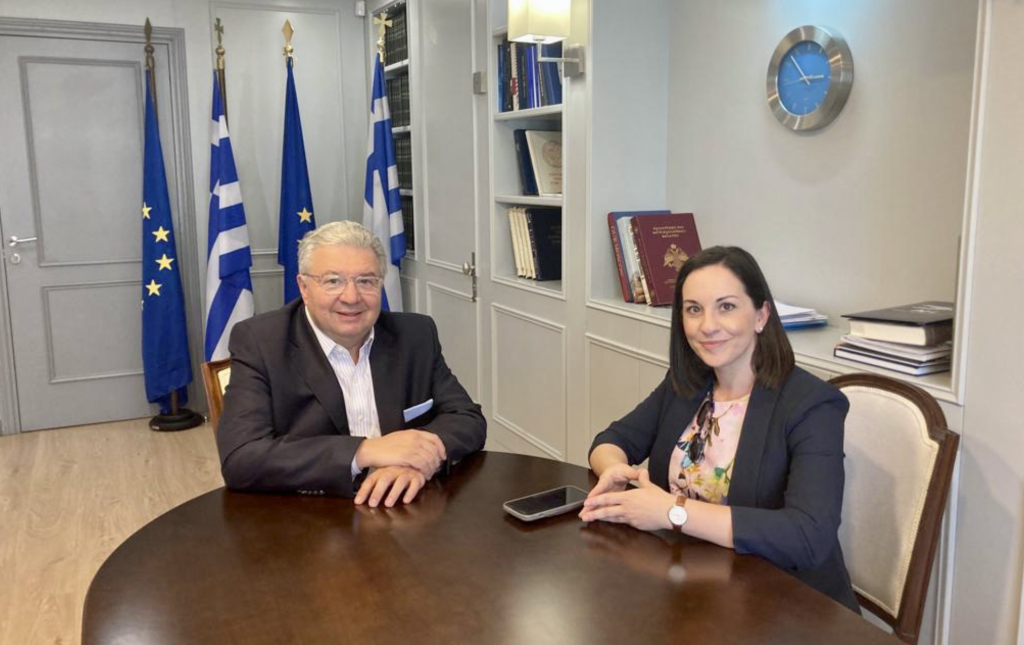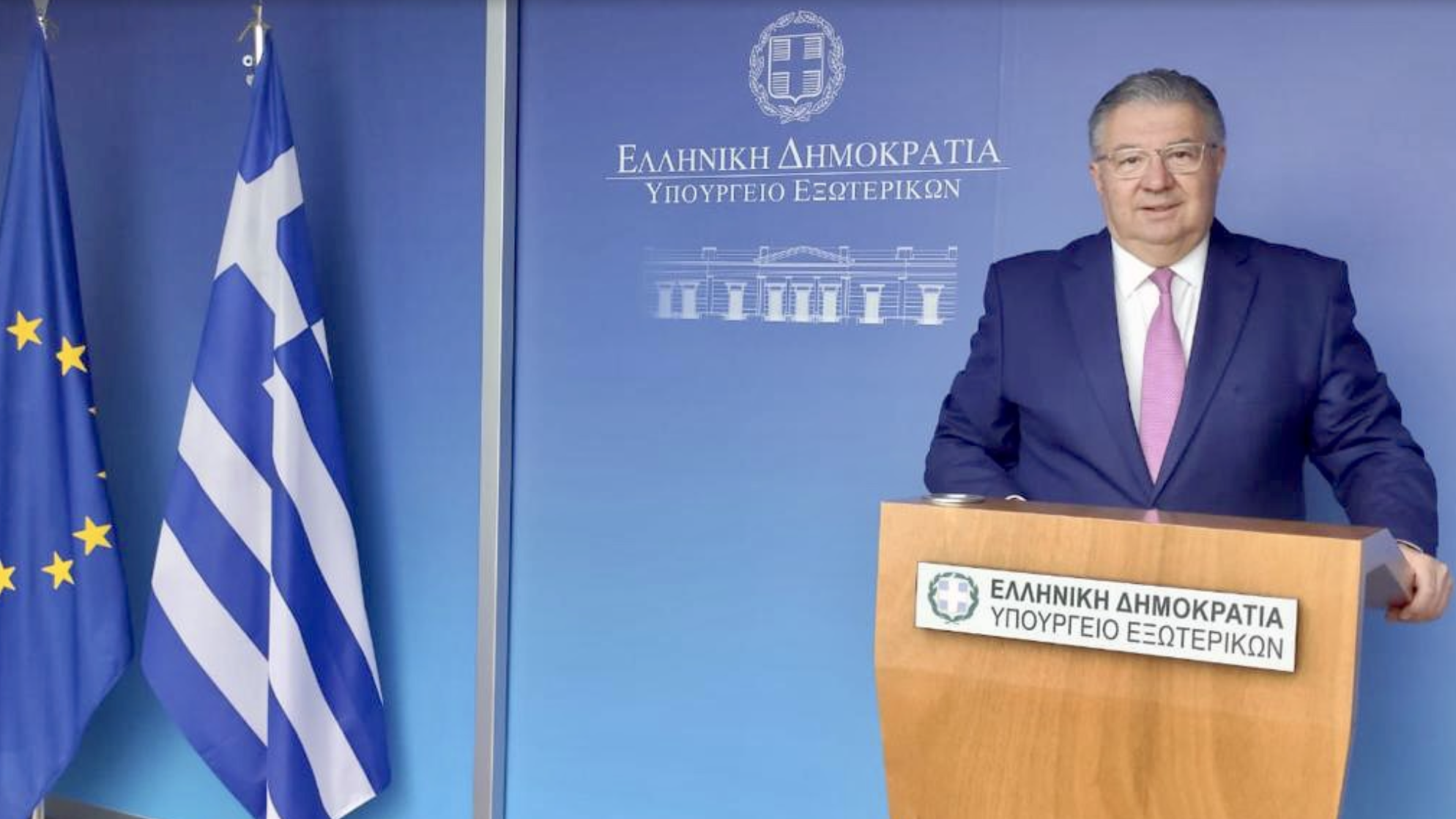Friendly, knowledgeable about what is happening in Australia’s Greek diaspora and open to new ideas and dialogue – the Secretary General for Greeks Abroad, John Chrysoulakis, hosted The Greek Herald in his office in Athens, Greece and spoke to us about the actions of the General Secretariat so far, his plans for further engagement with the diaspora and the possibility of visiting Australia early next year.
GH: How would you describe Australia’s Greek diaspora in one sentence?
First of all, I warmly thank your reputable newspaper, The Greek Herald, for the opportunity to communicate once again with my expatriate friends in Australia.
It is really difficult to describe in one sentence such a successful example of the diaspora as the Greeks in Australia. The Greek diaspora of Australia, despite being spatially remote, are one of the most vibrant cells of Hellenism outside the borders of Greece, with dynamism, creativity and an established path.
It is a model community with members who have fully integrated and are making progress in the host country, while maintaining the flame of our culture and heritage, transferring and diffusing their universal values and taking an active role in the promotion of our country and in the promotion of Greek interests before international public opinion.
For all these reasons, on behalf of the Greek state and the Greek government, we warmly thank our brothers in Australia for everything they have achieved, which fill us with pride, while at the same time reminding us in the most emphatic and positive way of our great responsibility and our fundamental duty to maintain and strengthen ties with the Greek community.
GH: In recent years, the Greek government, through various actions and through your own multifaceted activity, has come closer to the Hellenism of Australia. If we asked you to name your three most important actions so far, what would they be?
I will start by referring to actions of the General Secretariat for Greeks Abroad and Public Diplomacy aimed at preserving and disseminating the Greek language, an issue on which we are particularly sensitive and is one of the main axes in the formulation of our policy and in the exercise of our work. We have proven this in practice, through many initiatives that we have undertaken within the framework of our responsibilities, through supportive actions and collaborations with academic and institutional bodies of the Greek diaspora, of course in Australia.
The Greek language, vehicle and carrier of Greek thought and culture, has been continuously for millennia a fundamental cohesive element and quintessence of our identity. In particular, for the Greek diaspora, especially for those who were born or grew up in another country, such as distant Australia, the Greek language is still considered as the “mother tongue”, regardless of the language of everyday life, socialization or primary education. This is because Greek is identified with Hellenism, its culture and roots and is a primary, structural element of the indestructible relationship with the mother-Homeland. Let us remember what our Nobel laureate poet, Odysseas Elytis, said: “Language is not only a means of communication. It carries the soul of our people and the history of Greece and all its nobility.”
One of our most important initiatives in this regard is the creation of the digital platform Staellinika.com. it is an innovative and easy-to-use digital tool for learning the Greek language, but also for familiarizing users with Greek history and mythology. The application resulted from our successful collaboration with the Stavros Niarchos Foundation and the Stavros Niarchos Foundation Centre for Hellenic Studies at Simon Fraser University in Vancouver. We have over 35,000 registered users and 2 million visitors in more than 150 countries.
The program is already used individually or at school level and in Australia. Our desire is for it to become as widely known as possible to the Greek community. I also make it known at every opportunity of my contact with the Greeks abroad. I hope that we will soon come to officially present it to schools in Australia, as it has already been done in other countries, in order to expand its circle of users even more.

Answering further your question, I will also note the collaborations we have developed with academic institutions and I will dwell indicatively on our fruitful cooperation with two important universities in Australia. Among other actions, this summer we supported the organisation of the 8th International Summer University “Greek language, culture and media” in Kastellorizo, by the University of Ioannina in collaboration with the program of Modern Greek Studies of Macquarie University, with which we have developed a wider cooperation. In November I will participate in an event for the announcement of the findings of the Summer University and the presentation of the collective volume “language and freedom of expression”, a partnership between Greece and Australia, published in Sydney and which includes my text.
Moreover, in May I participated in the 3rd Conference on the Greek diaspora on “synchronic and diachronic aspects of the Greek diaspora”, which was organised by Charles Darwin University in collaboration with the University of Macedonia and the University of the Aegean.
Another action of ours that I would like to dwell on and fills me with joy and optimism, is the resumption of hospitality programs for our young and young expatriates, which we successfully reactivated this year after a short break due to the pandemic. As you may know, in collaboration with the Greek community of Melbourne and the Christian Youth Association of Thessaloniki. in July, we organised a youth hosting program for Greeks abroad from Melbourne, Thessaloniki and northern Greece.
The young people who participated had the opportunity to get to know up close, both modern and ancient Greece, the cultural and archaeological wealth of our country, to visit sights, to enrich their knowledge and feel proud of their place of origin and, of course, to improve their Greek.
I will also refer to a promising collaboration that we started with The Sydney Festival. This prominent institution completes this year forty years of presence and rich cultural events to promote the diverse manifestations of Greek culture. It has become a cultural event of recognised prestige for the Hellenism of Australia – and not only – and, as I have already mentioned in my meetings, we stand by it at every step, looking forward to the development of a productive cooperation.
G.H: You have mentioned many times that you want to “activate” the diaspora. What do you mean by this and how do you intend to do so?
The Greeks abroad, I want to repeat emphatically, constitute one of the important, comparative advantages of Greece in international competition. Nowadays and in the field of international relations, the countries that have a strong diaspora are considered strong. This is easily understood, if one observes the exploitation of the Diaspora by countries such as Israel, China and India. On the other hand it takes into account the fact of the active participation of Greeks in the political and social life of the local foci of Diaspora Hellenism. We not only have this comparative advantage, but also the will, at political and national level, to exploit it in the best possible way.
I remind you that the implementation of a modern policy for Greeks abroad is a national and strategic choice and is largely part of the call from the beginning of the Prime Minister, Kyriakos Mitsotakis to join in a broader, nationwide reconstruction effort. Therefore, the” activation ” of the diaspora is a matter of paramount importance for us. The policy to achieve this goal is multi-faceted, while it acquires an even more complex and multidimensional character in the contemporary conditions that are co-shaped by the factors of digitization, globalization and the policies of the diaspora networks.
It is obvious that I cannot cover such a broad topic, so I will limit myself to indicative references to only some of the parameters that compose it.
Our primary goal is to connect our expatriates with each other, but also with the Metropolitan Centre through the creation of successive and concentric networks, academic, business, artistic/cultural, youth, etc. This interconnection can and should be mutually beneficial, both for the rich potential of our diaspora and for the Metropolitan Centre.
Another parameter of our planning concerns the creation of incentives for the active participation of expatriates in the country’s recovery. In my meetings with the Greek community, I make sure to provide information on the policies of the Greek government to attract investment and the policies to support young workers. Greece has already attracted significant investments of extroversion, innovation and high added value, resulting in high quality jobs. These investments will continue to increase as long as the country’s consistently positive course reinforces the sense of confidence that has been created over the past three years regarding the long-term prospects of the Greek economy.
However, it should be noted at this point that the activation of the Greek diaspora could not be achieved without the active participation of our fellow citizens outside the borders in the country’s Commons, with the satisfaction of the chronic and fair demand for the granting of the right to vote to the Expatriates. The Greek government, considering that the strengthening of the ties of our expatriates with the Metropolitan Centre is a national and political priority, in one of its first initiatives and honouring its commitments, proceeded to regulate the issue with the passage of Law 4648 in December 2019. This is because all Greeks must have a say in what is happening in Greece.

It should be noted here that, although for reasons dictated by the need for political consensus in its passage, the law still places some restrictions, it is undoubtedly an important first step. Our aim is soon in the future to remove the last obstacles and Greeks abroad, all our expatriates, to be able to vote all from their place of residence.
In addition, by Law 4781 of 2021, care was taken for the “reopening of the Council of Hellenes Abroad”, which has as its mission the institutional and collective expression of all the forces of Hellenism outside the borders, acting as an advisory body of the Greek state on issues concerning expatriates.
I could not fail to mention in closing the substantial improvement of the quality of the services provided by the Greek consulates to our expatriates, through the digitization processes. These are services that you know and now make use of, such as the myConsulLive service, the Virtual Assistance digital assistant service using artificial intelligence and the direct registration of registry events that occur abroad, in the information system “Citizens’ Register”. All these services solve chronic bureaucratic problems faced by our expatriates and according to the messages we receive, they substantially support them in the settlement of their registration and other issues, ultimately strengthening their trust and relationship with the motherland.
G.H: Recently many young people from the diaspora, including a group from Melbourne, visited Greece. We can look forward to more such programs in the near future?
I have repeatedly stressed that the new generation of expatriates is a valuable chapter of ecumenical Hellenism and as such should be a priority in the planning, planning and implementation of each of our policies. For this reason, we are already organising programs for expatriate youth, according to international standards, which are successfully followed by other countries with a strong diaspora.
Hosting our expatriate youth from Melbourne this summer was just a fresh start. I express the certainty that next summer we will have the pleasure of implementing a multiple number of hospitality programs. We encourage the young people of our diaspora to visit Greece to get acquainted with the values of the Greek culture and the spiritual traditions of the country of their ancestors, to enjoy the natural beauties of our homeland and its unparalleled hospitality.
As I mentioned at the Summer University in Kastelorizo, we want Greeks, wherever they are, to feel close to their homeland. We want their children to know their roots and the unique wealth they have inherited. We want them to be able to participate in Greek education. We want the bright light of Greek culture to be passed on to the generations to come. We want our homeland to continue to be the beacon of values and love for man throughout the world.
The messages that came to us this year were very positive and we look forward to the fruitful cooperation with both the Greek communities in Australia, as well as the Church, academic institutions, educational and other institutions for the further development of the hospitality programs of young expatriates in Greece. For our part, in cooperation with other competent bodies, we are open to suggestions, ideas and requests to respond in the best way to the expectations and dreams of our young expatriates from their contact with the motherland.
G.H: Nevertheless, there are issues that have been raised for discussion, such as the double taxation agreement, which have been launched but are still pending.
The Greek government knows that the issue of double taxation is of serious concern to our Greek diaspora in Australia. As the governor of The Independent Public Revenue Authority, George Pitsilis, stated speaking with representatives of the Greek diaspora of Australia at the beginning of the month in Sydney, discussions are underway by the Ministry of Finance and AADE with the Government of Australia for the conclusion of a double taxation agreement between Greece and Australia.
If such an agreement is signed, it is expected to have a positive impact on the Greek diaspora here, as 82.000 Australian nationals are TFN holders in Greece, 30.000 of them have Greek citizenship, while another 51.000 who have Australian citizenship are estimated to also be descendants of our expatriates.
This is, undoubtedly, a very important issue that concerns both our expatriates and Australian entrepreneurs who wish to live or invest in Greece, but also Greek companies or Greek investors who wish to do business in Australia. Indicative of the importance attached to the issue is the fact that there was an exchange of official correspondence between the two countries at the highest level, including letters between the two prime ministers, expressing a mutual strong commitment to conclude the agreement as soon as possible. Let me remind you that Greece has concluded similar mutually beneficial contracts with 57 countries and the conclusion of the negotiations is a constant pursuit and a high priority issue of the Ministry of Finance.
G.H: Is a visit to Australia in your immediate plans?
Visiting Australia has been very high on my priorities since I took office. Unfortunately, for various reasons, most notably the restrictions imposed by the health crisis at the time of the pandemic, it was not possible to make this visit.
However, as I mentioned above, I have regular and substantial communication with many expatriates from Australia, with academics, with young people, students and, of course, with the organised, expatriate communities.
Thanks to technology, I have held a large number of online meetings with our compatriots, we have chatted, we have developed cooperation and it is a pleasure for me to welcome them in my office in Athens when they visit Greece – something that happens regularly.
I hope that during the first months of the new year, perhaps in February or March 2023, I will have the pleasure and honour to visit Australia, a visit that will be a milestone for me in the exercise of my duties and at the same time will bring me in direct contact with all the dynamism that the Hellenism of Australia exudes.
G.H: What’s your message to Australia’s Greek diaspora?
The vital forces maintained by the Greek diaspora in Australia, which remains always ready for action and progress, guided by the values of Hellenism, are indeed impressive. I express to you our sincere interest and love. We are always at your side, to listen to you, to respond to your needs and to assist your work with all our forces.
READ MORE: ‘Let’s set a few goals and achieve them together’: Consul General of Greece in Sydney

